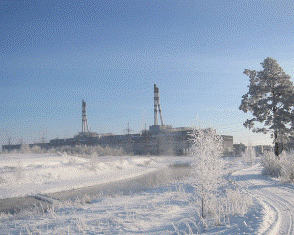Lithuania votes on nuclear options
13 October 2008
Voters showed strong support for ignoring EU requirements to close the Ignalina nuclear power plant at the weekend. Lithuanian leaders say they cannot meet demand and climate change needs without the plant.
 |
Chilly days at Ignalina are set to get a
whole lot colder after 2009 |
The Ignalina nuclear power plant was established near Visaginas in Lithuania to serve the entire Baltic region during the Soviet era. After independence its two RBMK-1500 reactors gave Lithuania a lot of power to export, but the country's agreement to join the EU meant that one reactor had to close at the end of 2005 - the other at the end of 2009. Energy minister Vytas Navickas said that with 70% of Lithuanian electricity coming from the single nuclear power plant, it acts as an 'energy independence and security guarantor'.
With the 2009 shutdown date looming large, and a replacement nuclear project only likely to yield new capacity around 2016, Lithuanian leaders have discussed ignoring the EU requirements, or forcing a new set of terms.
Last weekend's vote was on a non-binding proposal to operate Ignalina 2 until 2012. Although over 88% of voters supported the idea, the turnout of 47% was below the mandated 50%. In any case, it is hard to see how the EU could agree to change the agreement: Other countries in Eastern Europe have faced similar operating restrictions: Bulgaria had to shut down Kozloduy 3 and 4 and Slovakia had to shut down the first reactor of Bohunice V1. There is a vocal campaign in Bulgaria to restart the Kozloduy units.
Navickas has recently made diplomatic rounds with a proposal for the EU. He has told his European counterparts that Lithuania pays the highest prices for gas in Europe, which has forced power prices up by a factor of four. This is partly because the country has no connections to the EU electricity and gas grids and can only import from Russia. Nyackas considers that about €1 billion ($1.36 billion) in extra compensation would be required to offset the costs of increased reliance on fossil fuels. Separately, he is working on grid connection projects with Sweden (and therefore the Nordic grid) as well as Poland.
Another major difficulty relates to the millions of tonnes in carbon dioxide savings Ignalina currently gives annually compared with a typical mix including far more fossil fuels. Meeting carbon reduction targets would be impossible while still closing Ignalina, and Lithuania should have concessions in carbon emission permits too, Navickas said.
'Considering all circumstances, and without prejudice to Lithuanian security interests, we can only close Ignalina after 2012,' Navickas said in a ministry statement, concluding that without a new deal 'Lithuania will not be able to agree the climate change package.'